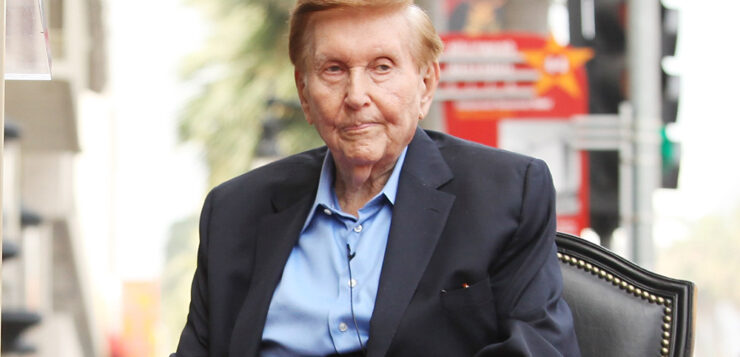Starting with a chain of drive-in movie theaters, Mr. Redstone negotiated, sued and otherwise fought to amass a domain that included CBS and Viacom.

By Jonathan Kandell The New York Times
Sumner M. Redstone, the billionaire entrepreneur who saw business as combat and his advancing years as no obstacle in building a media empire that encompassed CBS and Viacom, died on Tuesday. He was 97.
His death was announced in a statement from National Amusements, the private theater chain company founded by his father.
Mr. Redstone had vowed never to give up the reins of his sprawling conglomerate, but in February 2016 he stepped away from managing it, and his daughter, Shari E. Redstone, with whom he had a contentious relationship, took control of day-to-day affairs.
Beginning with a modest chain of drive-in movie theaters, Mr. Redstone negotiated, sued and otherwise fought to amass holdings that over time included CBS, the Paramount film and television studios, the publisher Simon & Schuster, the video retail giant Blockbuster and a host of cable channels, including MTV, Comedy Central and Nickelodeon. At their peak, the businesses he controlled were worth more than $80 billion.
Toward the end of his life, he controlled about 80 percent of the voting stock in Viacom and CBS, presiding over both through National Amusements. And almost to the end, his grip was tight and his enthusiasm undiminished.
“Being a competitor of Sumner Redstone’s is a fate worse than death,” Barry Reardon, who oversaw distribution for Warner Brothers, a rival studio, told Premiere magazine in 1994. “He never lets up. He’s relentless.”
That kind of tenacity helped save Mr. Redstone’s life. At 55, he survived a fire that engulfed his Boston hotel room by clinging to a window ledge while half his body was scorched. “I think I was driven before, but out of that fire came most of the exciting things I have ever done,” he told Forbes magazine.
Mr. Redstone was a ripe 64 when he burst into the business limelight in 1987 by winning control of Viacom, a cable television operator at the time, from an investment group led by Viacom’s management. To acquire major companies, he frequently dueled with powerful, and much younger, entrepreneurs. In 1994, after a grueling struggle, he confounded Wall Street analysts by wresting Paramount from a heavily favored rival bidder, Barry Diller, who was almost 20 years his junior.

Well past 80, Mr. Redstone was running his businesses with little thought about retirement. One after another, associates who had been groomed to succeed him either resigned or were fired. In 1996, he dismissed his highly regarded chief executive, Frank Biondi Jr., and took the reins of Viacom himself. When critics suggested that at 72 he was too old for the top job, Mr. Redstone, at a news conference, compared himself to Bob Dole, the Republican candidate for president that year, who was the same age.
“If he can run America, believe me, I can run Viacom,” Mr. Redstone said.
At 83 and a billionaire several times over, he roiled the entertainment world again in August 2006 by emerging from luxurious semiretirement in Beverly Hills to sever ties with Paramount’s biggest star, Tom Cruise.
Mr. Redstone had been irritated by Mr. Cruise’s offscreen behavior — proselytizing for the Church of Scientology, denouncing psychiatry and jumping up and down on a sofa as a guest on Oprah Winfrey’s television show. He was also concerned that Mr. Cruise’s contract gave the actor a hefty chunk of the profits from his films.
About two weeks later, Mr. Redstone fired Thomas Freston, the chief executive at Viacom, saying he had not done enough to increase the company’s share price.

Besides being an empire builder, Mr. Redstone was an innovator. He was a pioneer in the wide-scale adoption of multiplex cinemas. He conceived a revenue-sharing arrangement with film companies that radically changed the economics of the video rental business by convincing Hollywood that video stores — just like movie theaters — should be allowed to split revenues with filmmakers rather than pay flat fees. He also devised deals that allowed him to limit the risks and to share expenses involved in film production with other studios and investors.
Mr. Redstone, who was a successful lawyer before becoming a businessman, was an unyielding negotiator. “I believe in taking every penny off the table,” he wrote in his 2001 autobiography, “A Passion to Win,” written with Peter Knobler.
When he was stymied by competitors or exasperated with big client companies, he did not hesitate to take them to court, and almost invariably won or got them to settle on his terms. At one time or another, he sued almost every major film studio and the leading cable operators. Using the courts as a weapon of business would become a signature move, helping him expand his empire.
“I would rather handle disagreements through discussion and accommodation,” Mr. Redstone wrote. “But if that fails, and it often does, litigation is an appropriate tool.”
In the end, new media trends and old age proved Mr. Redstone’s implacable foes. A younger generation had turned increasingly toward video streaming rather than broadcast and cable television, and his obvious infirmities had weakened his ability to lead a business on so vast a scale.
A Boy From Boston
Mr. Redstone was born Sumner Murray Rothstein on May 27, 1923, in Boston, where he grew up in the predominantly Jewish West End. His father, Max Rothstein, peddled linoleum from the back of a truck, and his mother, Belle (Ostrovsky) Rothstein, was a housekeeper.
Sumner was accepted to Boston Latin, the city’s leading public school, and drove himself hard there, in part to please his demanding father. “Whatever we did was not quite good enough,” he wrote in “A Passion to Win.” He emphasized his early ambition throughout the book:
— “I got up every morning, took a streetcar to school, and from that moment on I lived in terror. I wanted to be No. 1 in my class, and I did nothing but study.”
— “All I had going for me was an education. We certainly didn’t have any money. The 10 cents a day I spent on round-trip streetcar fare was a significant sacrifice for my family, and I had to justify that sacrifice.”
— “I had to know my subjects cold, with not even the most minimal margin for error. There could be no slips now, no lapses, and there would be no mercy if I made them.”
— “I had no social life. I had no friends. I knew people only because I sat next to them in class or because they were my closest competitors for the school awards.”
When a bout of scarlet fever forced him to miss school for a month, he worried about falling behind academically. But he was a standout on the school debate team and graduated first in his class — “with the highest grade point average in the 300-year history of Boston Latin,” he boasted in his autobiography, without specifying the number.
It was during the summer after high school that his father changed the family name to Redstone. The family had been observant Jews, and Sumner had studied the Talmud, so he was surprised by the change. “It’s a much better name,” he quoted his father as saying. He enrolled at Harvard, on a scholarship, as Sumner Redstone.
He breezed through Harvard in three years. Especially skilled in languages, he was invited to Washington during World War II as part of a team of United States Army cryptographers who cracked Japanese military and diplomatic codes. He returned to Harvard after the war and received a law degree.
In 1947, Mr. Redstone married Phyllis Raphael, with whom he had a daughter, Shari, and a son, Brent. The newlyweds moved to San Francisco, where Mr. Redstone became a clerk with the United States Court of Appeals and later taught law at the University of San Francisco.

He went on to become a special assistant to Attorney General Tom C. Clark in Washington, where he litigated more than 50 cases. (Mr. Clark later served on the Supreme Court.)
In 1951, Mr. Redstone became a partner at a Washington law firm, Ford, Bergson, Adams, Borkland & Redstone. But though the practice was profitable, he abandoned it three years later to work for his father, who had saved enough money to buy a drive-in movie theater. He would add 11 more. They worked out of an office in Dedham, Mass. A younger brother, Edward, also worked for the company before going into banking.
At the time, movie studios looked down on drive-ins as low class and did not lease them first-run films. Putting his legal background to good use, Mr. Redstone successfully sued the major studios to change that policy.
But with the popularity of his drive-in theaters in decline, Mr. Redstone ripped them down and used their cheap real estate on the outskirts of towns and cities for indoor cinemas. Beginning in 1962, he opened complexes with multiple cinema houses, and named them multiplexes.

With business profits being squeezed by the high fees the film studios were charging, Mr. Redstone, in 1979, again resorted to a major lawsuit, against Walt Disney, Columbia Pictures, Universal, United Artists, Paramount, 20th Century Fox and Warner Bros. The suit accused the studios of “blind bidding,” a practice that forced theaters to pay large sums for the right to show new films, sight unseen.
He ultimately reached a settlement with the studios, which agreed to stop demanding disproportionate advances from movie theaters for money-losing films.
‘I Was Enveloped in Flames’
It was in 1979 that Mr. Redstone almost died in a fire at the Copley Plaza Hotel in Boston. It was started by a disgruntled former hotel employee late at night, when most guests, including Mr. Redstone, were asleep.
“I was enveloped in flames,” he wrote. “The fire shot up my legs. The pain was searing.” He staggered to the window and hung from a ledge on an upper floor until firefighters rescued him. He suffered third-degree burns over 45 percent of his body, and it took five operations over several months to restore him to health.
Mr. Redstone acquired Viacom and its cable channels in 1987 by going deeply into debt and putting up the family movie-chain business as collateral. His financial burdens mounted when Time Inc., one of the largest cable operators in the country at that period, shut out Viacom’s channels from New York, Denver and other profitable markets. Mr. Redstone sued, forcing Time to settle on terms that he considered favorable.
He expanded Viacom vastly in 1994 when he beat out Mr. Diller for control of Paramount. He received word that the sale had gone through while dining late with colleagues at the Manhattan restaurant “21.” “Here’s to us who won,” Mr. Redstone said, toasting his guests with champagne ordered by his son.
Age 70 at the time of the deal, the mogul said in an interview with The New York Times that he had no intention of stepping back. “Yesterday, I ran two and half miles on a treadmill and I played tennis for an hour,” Mr. Redstone said.
Wall Street analysts insisted that Mr. Redstone would never recoup the almost $10 billion spent to acquire the studio. And when Mr. Redstone fired Mr. Biondi, Viacom’s chief executive, in 1996, the company’s share price sank even more. The Wall Street Journal described Mr. Redstone as “an iron-fisted autocrat” for taking Mr. Biondi’s post. “Sumner’s Last Stand” was the headline of a cover article in Businessweek magazine in 1997.
But Mr. Redstone sold what he considered Viacom’s noncore businesses and soon recovered most of the money he had spent on Paramount. “Paramount now looks like a bargain” for Mr. Redstone, Forbes declared in 1998.
A year later, Viacom was healthy enough to swallow up CBS in a $37.3 billion merger. Mel Karmazin, the CBS chief executive, then 56, agreed to stay on as Mr. Redstone’s second in command and heir apparent. But in 2004 Mr. Karmazin resigned, as Mr. Redstone, 81, again asserted full control over Viacom and announced plans to run his empire for as many as three more years.
By 2006, however, Mr. Redstone appeared to have retreated into semiretirement. After splitting off CBS as a separate company from Viacom, he stepped down as Viacom’s chief executive and appointed a longtime associate, Thomas Freston, 60, to the post. But within nine months Mr. Redstone had begun expressing frustration over Viacom’s sluggish stock price, and Mr. Freston was abruptly out, replaced by another loyal adviser, Philippe P. Dauman.

Only two weeks before, Mr. Redstone had announced that Paramount would not renew its longstanding contract with Mr. Cruise.
At the time of the Viacom-CBS breakup, Mr. Redstone named Leslie Moonves as the chief executive of the CBS Corporation. Mr. Moonves stayed in that role until September 2018, when he was ousted after more than a dozen women publicly accused him of sexual misconduct.
Toward the end of Mr. Moonves’s run as CBS chief executive, Shari E. Redstone made moves to recombine Viacom and CBS. The result was a high-profile battle for control of the two companies that fizzled when Mr. Moonves departed.
But in August 2019, Ms. Redstone got her wish when both companies announced they had agreed to merge.
A Last Hurrah
In 2012, at a celebrity-packed party at the studio commemorating the centennial of Paramount, Mr. Dauman raised a glass to Mr. Redstone and repeated a toast his boss had made when the deal was sealed: “Here’s to us who won.”
The moment proved to be Mr. Redstone’s final hurrah. Over the next few years, the rise of video streaming cut deeply into advertising revenues from traditional television broadcasting and cable. Viacom, which prided itself on its appeal to children and teenagers, was especially hard hit by this trend, as millions of young viewers opted to watch their entertainment on mobile phones and tablets.
Mr. Redstone’s last years were marked by court disputes that questioned whether he was still mentally competent enough to make decisions about his health care and preside over his media empire.
He was also at odds with his children. His son, Brent, sued him in 2006, asserting that he was entitled to more than $1 billion in National Amusements, the family company that his father had used to control shares in Viacom and his other enterprises. The lawsuit was settled two years later when Mr. Redstone agreed to buy out his son’s interest in the company for about $240 million.
Mr. Redstone also soured on his daughter, who was vice chairwoman of both Viacom and CBS. By 2006, he had become publicly critical of her and said he had no plans to turn over the business to her. They later clashed over mounting debts, leading in 2009 to an announcement by National Amusements that it would sell off almost $1 billion in Viacom and CBS stock shares while retaining control of both holdings. But father and daughter later smoothed over their relationship.
“My father led an extraordinary life that not only shaped entertainment as we know it today, but created an incredible family legacy,” Ms. Redstone said in a statement Wednesday.

In 2016, Mr. Dauman faced off against Mr. Redstone, who was in failing health, and his daughter over whether Mr. Redstone was still mentally competent enough to run the company. After a three-month battle in several courts, Mr. Dauman was forced out of Viacom and accepted a reported severance package of about $72 million.
In 1999, Mr. Redstone’s wife, Phyllis, filed for divorce after 52 years of marriage. In 2003 he married Paula Fortunato, a 40-year-old former schoolteacher. They divorced in 2009.
He had several romantic entanglements later on. In a 2016 lawsuit, it emerged that he had reportedly given a former girlfriend, Sydney Holland, $70 million in cash and gifts before kicking her out of his house.
In early 2019, Mr. Redstone settled a long-running legal battle with another former girlfriend, Manuela Herzer, who alleged he had lost his mental capacity. She was named a beneficiary in his will and stood to receive as much as $50 million and his Beverly Hills mansion. She had moved out several years earlier and was removed from his will, but her claims cast doubt on the future of his empire.
Those who knew Mr. Redstone sometimes said that he behaved as if he thought he would live forever, as if time might slow others down but not him. In 2009, he told the talk show host Larry King, “I have no intention of ever retiring, or of dying.”
Edmund Lee and Johnny Diaz contributed reporting.
Source: The New York Times





